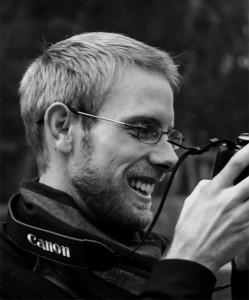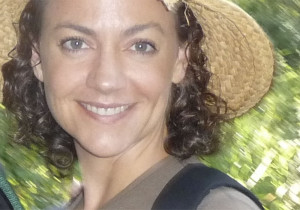Last Friday, the Academy of Motion Picture Arts and Sciences announced the winners of the 41st Student Academy Awards. Among the 15 winners were two recent Stanford M.F.A. graduates who have continued the Stanford film program’s tradition of excellence in this prestigious competition after a two-year lull.
J. Christian Jensen ’13 and Helen Hood Scheer ’13 claimed two of the three top spots in the documentary category, while Leslie Tai ’13 was one of eight finalists in the alternative category. All three were honored to be national finalists.
“It was an exciting moment, and it was made even greater when I saw listed with me these really close friends of mine,” Jensen said. “To see my friends also being recognized for amazing and entirely different works from my own was the cherry on top.”

The competition
Held by the same Academy that runs the Oscars, the Student Academy Awards is a national student film competition that presents gold, silver and bronze awards to the top submissions in four categories: alternative, documentary, narrative and animation. The winners are selected from the nominations of over 500 college and university film students across the United States.
Among the past Student Academy Award winners are prominent figures like Spike Lee and John Lasseter. Award-winning films are included in festival showings and benefit from increased prominence — critical publicity in the challenging world of filmmaking.
Clips from Jensen’s film, “White Earth” and Scheer’s, “The Apothecary,” will be screened at the awards ceremony on June 7 in Hollywood’s Directors Guild of America Theater, along with the third winning documentary, produced by Zijan Mu of New York University. The final medal placements for each category will be announced at the ceremony.
Their films
Jensen’s “White Earth” tells the story of the North Dakota oil boom through the eyes of three children and their immigrant mother. His film’s story was one of many that gained his attention as he began his work towards his M.F.A., but when he traveled to North Dakota, he knew he had found the quality of visual material he wanted.
“Once it gets dark, you see these flames coming out of the ground and these bright towers in the distance shining into the sky,” Jensen explained. “I was just really struck by the visual other-worldliness of that area. I knew that visually there was enough to keep me interested, and I was confident that I’d find the story to back that up.”
In “The Apothecary,” Scheer creates an intimate portrait of the sole pharmacist in a 4,000-square-mile region in the American Southwest. Scheer traveled to the town of Nucla, Colorado, expecting to cover the story of the pharmacy’s closure, but when the proprietor made a last-minute decision to keep the community landmark open, Scheer used her extensive preparation to pivot her focus.
“I think that the work I did developing the concept and the underlying themes that I wanted to focus on…and the rapport I had built with the character permitted me to adapt when I needed to,” Scheer said.
Tai’s experimental documentary in the alternative category, “The Private Life of Fenfen,” features a young Chinese migrant worker whose tragic love story is broadcast to other migrant workers in China.
According to Tai, Stanford’s program helped her to confront the negotiation of “the fine line between fiction and documentary” and provided the space to discuss the tensions faced by modern documentary filmmakers.

“I am completely [uninterested] in the façade that documentary is 100 percent real; I see that much of the work that is coming out these days is blurring the lines into a documentary-fiction hybrid,” Tai said. “I think directly addressing the subjectivity and perception of reality as being just that is the most appropriate way to deal with documentary.”
A history of achievement at Stanford
For decades, the Student Academy Awards have recognized exceptional work carried out by Stanford students. Stanford students have taken home more Oscars than their closest academic competitors (the University of California, Berkeley and Columbia University) combined over the last 14 years.
Jensen explained that the University’s M.F.A. program was one of the first to focus exclusively on documentary films.
“Stanford has a really long track record of excellence,” Jensen said. “Over time, it has developed a reputation, and it has become a place where really serious documentary film makers flock to, so that certainly helps with the quality of work that comes out of the program.”
Stanford’s program is also unusual for its two-year curriculum, in contrast to the three- to five-year programs offered by other renowned institutions. Jensen explained that the shorter timespan also helped him alleviate the cost of graduate school.
“Two of the reasons why I am such a champion of the program and why it worked so well for me were: first, that it’s a two-year program,” Jensen said. “Second, that it’s highly structured, which I think is important for me in that you enter the program having in mind a specific set of films that you’re going to be making.”
Tai emphasized the value of the Stanford M.F.A. program’s affiliation with the broader University.
“Stanford is amazing because out of all the [graduate documentary film programs], it is the only one that is attached to a world-class university,” she said. “I think there’s a lot in the curriculum that reflects that.”
The Student Academy Awards is just one of many prestigious award and festival processes in which Stanford has gained recognition over the years. Over the past several months, Tai, Jensen, Scheer and their peers have seen their films played in international festivals including France’s Festival International de Programmes Audiovisuels, Toronto’s Hot Docs, the International Documentary Film Festival Amsterdam Paradocs and the Museum of Modern Art’s Documentary Fortnight.

Looking to the future
For Scheer, the award represented a nationally respected accreditation that would help her to achieve her future goals in filmmaking and academia. She had her eye on the award prior to coming to Stanford and was thrilled that her M.F.A. work has brought her the recognition.
“Several years ago I was talking with a professor at a university in southern California, and I told him that my goal was to teach at his university or at another good school in the area,” Scheer said. “He turned his nose up at me and said the only way I could hope of getting a job at his institution was if I won a Student Academy Award or something like it.”
“Part of what I went to Stanford for was to increase my ability to handle complex material as a non-fiction storyteller,” Scheer added. “I also wanted to segue into teaching, and I knew what this award meant.”
All three finalists shared hopes to teach film and work with the next generation of documentary filmmakers.
“I’m really interested in pushing forward in exploring this authorial voice that I think I found at Stanford,” Jensen said. “I want to continue to do independent work, and eventually I would really like to teach. I really enjoy mentoring and working with other filmmakers who are passionate about what they do.”
Contact Dominica Wambold at dwambold ‘at’ stanford ‘dot’ edu.
Leslie Tai’s quote on the Stanford M.F.A. program has been edited to clarify that Tai was speaking on documentary film programs as opposed to film schools in general.